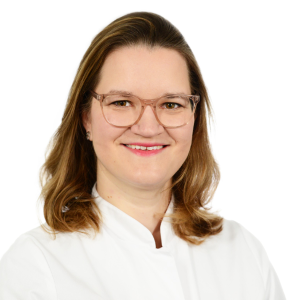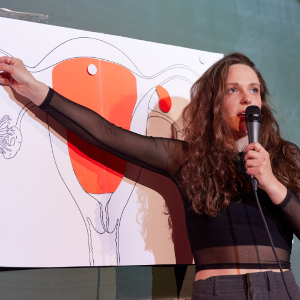Endometriosis: A disease that affects millions
17 Mar 2025
Despite its high prevalence, endometriosis often goes undiagnosed for a long time. An interview with a physician and a student at LMU who are both working to change that.
17 Mar 2025
Despite its high prevalence, endometriosis often goes undiagnosed for a long time. An interview with a physician and a student at LMU who are both working to change that.
March is Endometriosis Awareness Month. Since 1993, various initiatives have been working to raise public awareness of the disease at a fixed time each year. In this interview, Dr. Susanne Beyer, deputy director and coordinator of the LMU Endometriosis Center, and medical student Maren Rothkegel, endometriosis patient and artist, who raises awareness through slams and a video, talk about how society deals with the disease and new research approaches.
Despite its prevalence, not everyone is familiar with endometriosis. What are its symptoms and how is it diagnosed?
Maren Rothkegel: Endometriosis is a chronic condition in which tissue similar to the lining of the uterus grows outside the uterus—for example, on the ovaries, intestines, or other organs. In principle, it can settle anywhere in the body, but it usually occurs in the abdominal cavity. This tissue behaves like the lining of the uterus: it builds up during the cycle and bleeds, but cannot leave the body. This causes inflammation and often adhesions. These areas of inflammation flare up repeatedly, which can cause severe pain for those affected.
Susanne Beyer: Among other things, the so-called "four Ds" are important for diagnosis, which describe different types of pain: dyspareunia, pain during sexual intercourse; dysuria, i.e. pain when urinating; dyschezia, i.e. pain during bowel movements; and dysmenorrhea, menstrual pain. In addition, there is sterility, as endometriosis can also lead to infertility. Most patients have one or more symptoms.
The disease is very common, affecting around ten per cent of all women of childbearing age. This means that around 190 million people worldwide suffer from endometriosis.Maren Rothkegel
Why is the disease often detected late?
Maren Rothkegel: The disease is very common, affecting around ten percent of all women of childbearing age. That means around 190 million people worldwide suffer from it. Nevertheless, it takes an average of eight to ten years to get a diagnosis. Those affected often hear things like, ‘Pain during your period is completely normal.’ And then nothing is done about it.
Susanne Beyer: ‘Pull yourself together, it's all part of life’ – fortunately, you hear that less often today, but unfortunately you still hear it. In addition, the symptoms associated with endometriosis are often a source of shame for those affected. Pain during menstruation, pain during sex, an unfulfilled desire to have children: these are things that many people do not like to talk about openly. However, we are seeing changes at the clinic: we ask the women who come to our endometriosis consultation how long they have had the symptoms. More and more often, I hear that it has been less than five years.
So the awareness campaigns are having an effect?
Maren Rothkegel: I have the impression that the gradual removal of taboos surrounding shameful topics is helping to raise awareness of the disease, which means it can be diagnosed more quickly. We talk more openly in society about things like periods and the gender gap – and it's not just endometriosis; people affected by many other diseases are now better informed and more willing to talk about them. Overall, patients are becoming more independent and using the internet to acquire relevant knowledge. This also means that when people come to the doctor's office, they no longer assume that the doctor always knows everything.
Susanne Beyer: In fact, I get the impression at the clinic that many people come to me already very well informed. More and more often, women in gynaecological practices are also requesting to be referred to a specialist consultation like ours. And gynaecologists have also become much more attentive to the symptoms of the disease in recent years. The disease is not yet on everyone's lips, but it is much better known than it used to be. France, for example, has declared awareness of the disease a national cause with an ‘Endometriosis Year’, which has helped a lot. And when you add a rap video like Ms Rothkegel's to the mix, so much the better.
Maren Rothkegel: There is now a lot of information about endometriosis on social media, for example accounts where patients talk about their everyday lives, but also provide general information. This helps to build better networks. Awareness campaigns such as ‘Endometriosis Month in March’ stimulate discussion.
With this video, LMU student Maren Rothkegel and artist Julia Brumm aim to raise awareness of endometriosis. (Video and photo: ©️juliful Creative Studio, idea & concept @julia.brumm)
4 min | 28 Jan 2025

Dr. med. Susanne Beyer coordinates the Endometriosis Centre at the LMU Hospital. | © Klinikum der Universität München
Is increased awareness also leading to greater interest in research on this topic?
Susanne Beyer: The process is running somewhat parallel – the topic is receiving more attention in society and also in research. Research projects such as various endometriosis apps, which are widely accessible and can be used to aggregate large amounts of data, are further contributing to improving knowledge about this disease – among those affected and among those treating them.
Endometriosis currently remains an incurable, chronic disease. Research is very complex and addresses several aspects.Susanne Beyer

Maren Rothkegel also slams to raise awareness about endometriosis. | © LMU / Stephan Höck
What is the current state of research? What research questions are the focus of attention?
Susanne Beyer: Endometriosis remains an incurable, chronic disease. Research is very complex and addresses several aspects. These include, for example, how new drug therapies can be developed. Questions about surgery are also a focus: when should we operate, and when is it better not to? How can we improve surgery, for example in terms of intraoperative visibility of inflammation? How can we improve care? The big question remains why some people develop the disease and others do not: what is the protective factor, or where is the vulnerable point?
One exciting area of research is the role played by the immune system in the development of diseases. This aspect is already being researched in cancer, where great progress has been made. In endometriosis, we are still in the early stages. We are also investigating the extent to which the microbiome influences the development and progression of endometriosis, including through the use of artificial intelligence. We also hope this will lead to advances in research into the role of metabolism.
How is AI used in this context?
Susanne Beyer: AI can help us evaluate large data sets that are entered into apps. This generates a huge amount of data that we want to sort through in order to filter out factors that may be important for prognosis and diagnosis. Perhaps this will enable us to find a biomarker, for example, which could mean that laparoscopy will no longer always be necessary for diagnosis in the future. In general, the hope is to find an approach that not only controls the symptoms but actually cures the disease. That is the goal.
Ms Rothkegel, you will soon be completing your medical studies. Will you then also go into gynaecology and continue your research and treatment of the disease professionally?
Maren Rothkegel: I will probably not go into gynaecology, but the topic is important in all areas of medicine. Patients often visit their family doctor with abdominal pain. This is usually the first point of contact, even for younger people who, until recently, were still seeing a paediatrician and had never been to a gynaecologist. In this respect, there is still a lot of educational work to be done.
ABOUT THE PERSON
Dr. Susanne Beyer is a senior physician at the Clinic and Polyclinic for Gynaecology and Obstetrics at LMU Munich and coordinator of the Endometriosis Centre located there.
Maren Rothkegel is studying medicine at LMU. She is a trained health care nurse, endometriosis patient and artist. With a rap she wrote and composed herself, in which she describes life with the chronic disease, she won the Munich University Society's Science Slam in the freestyle category in 2024. The video ‘Cycle of Pain’, produced in collaboration with artist Julia Brumm, was viewed thousands of times on YouTube in its first month.